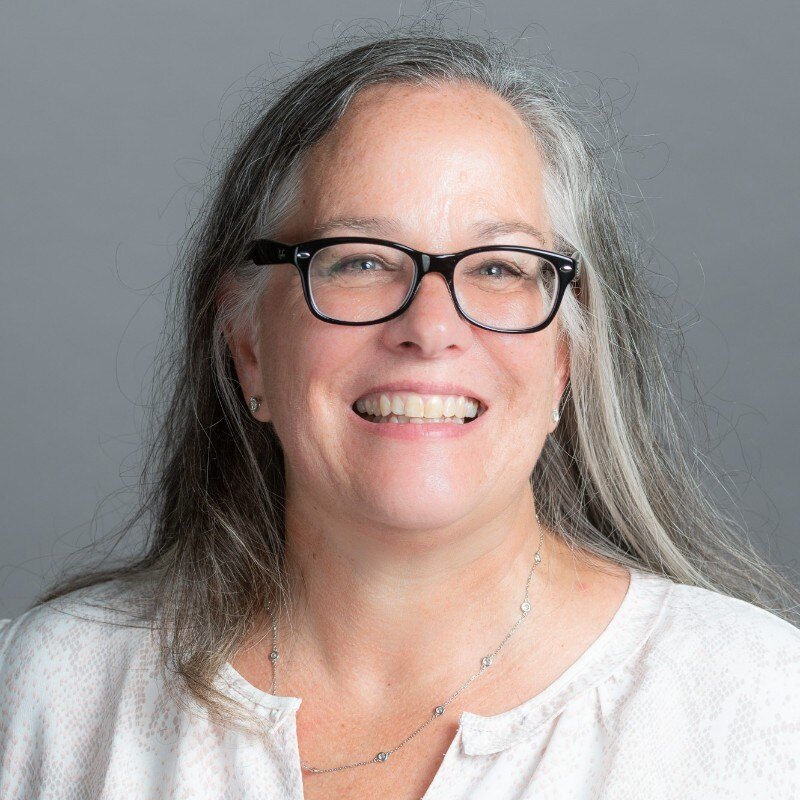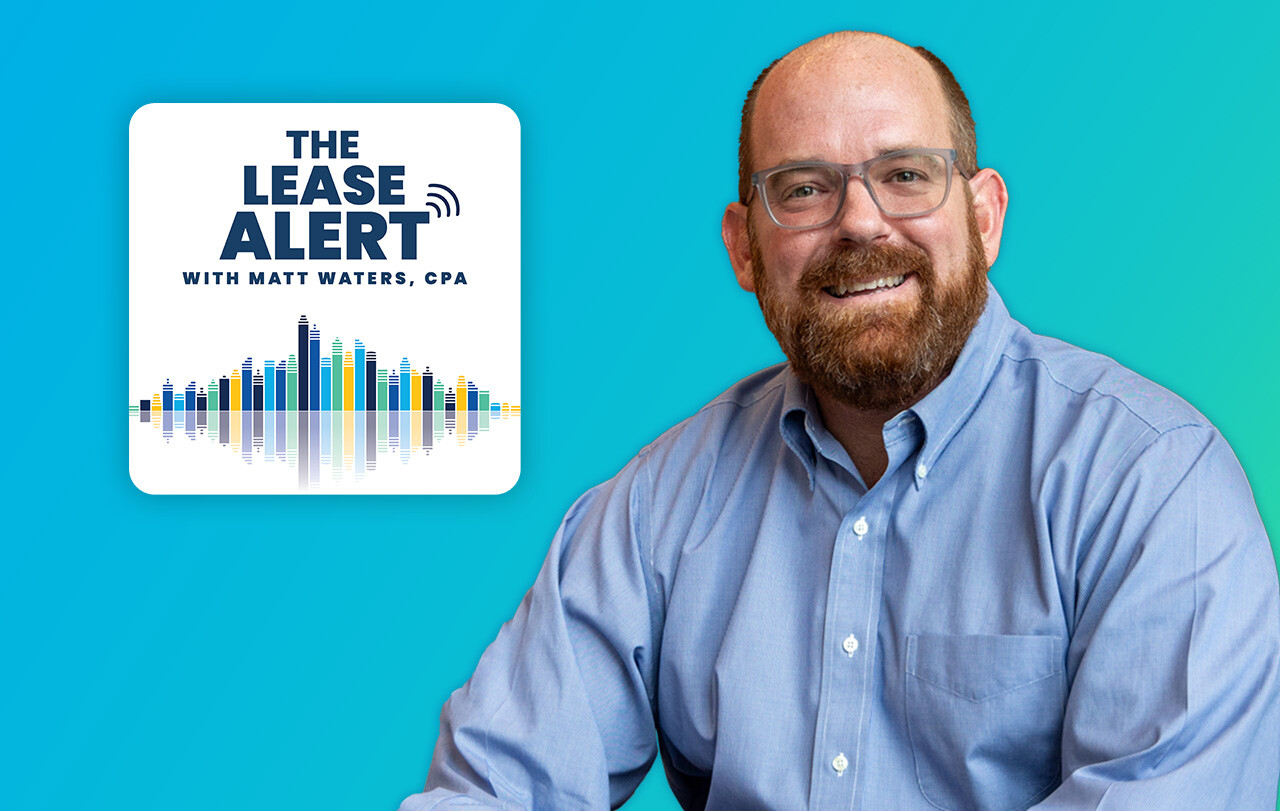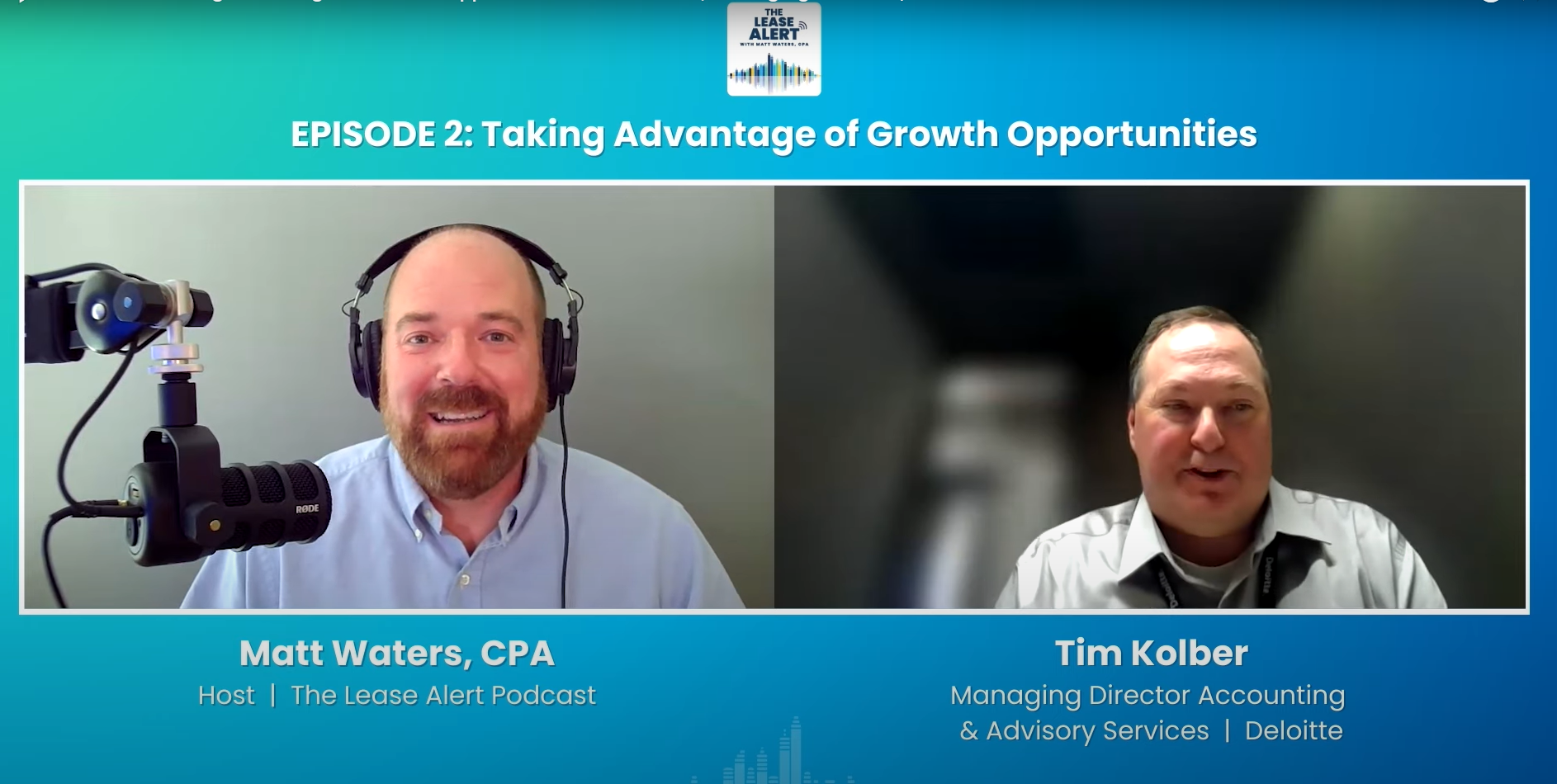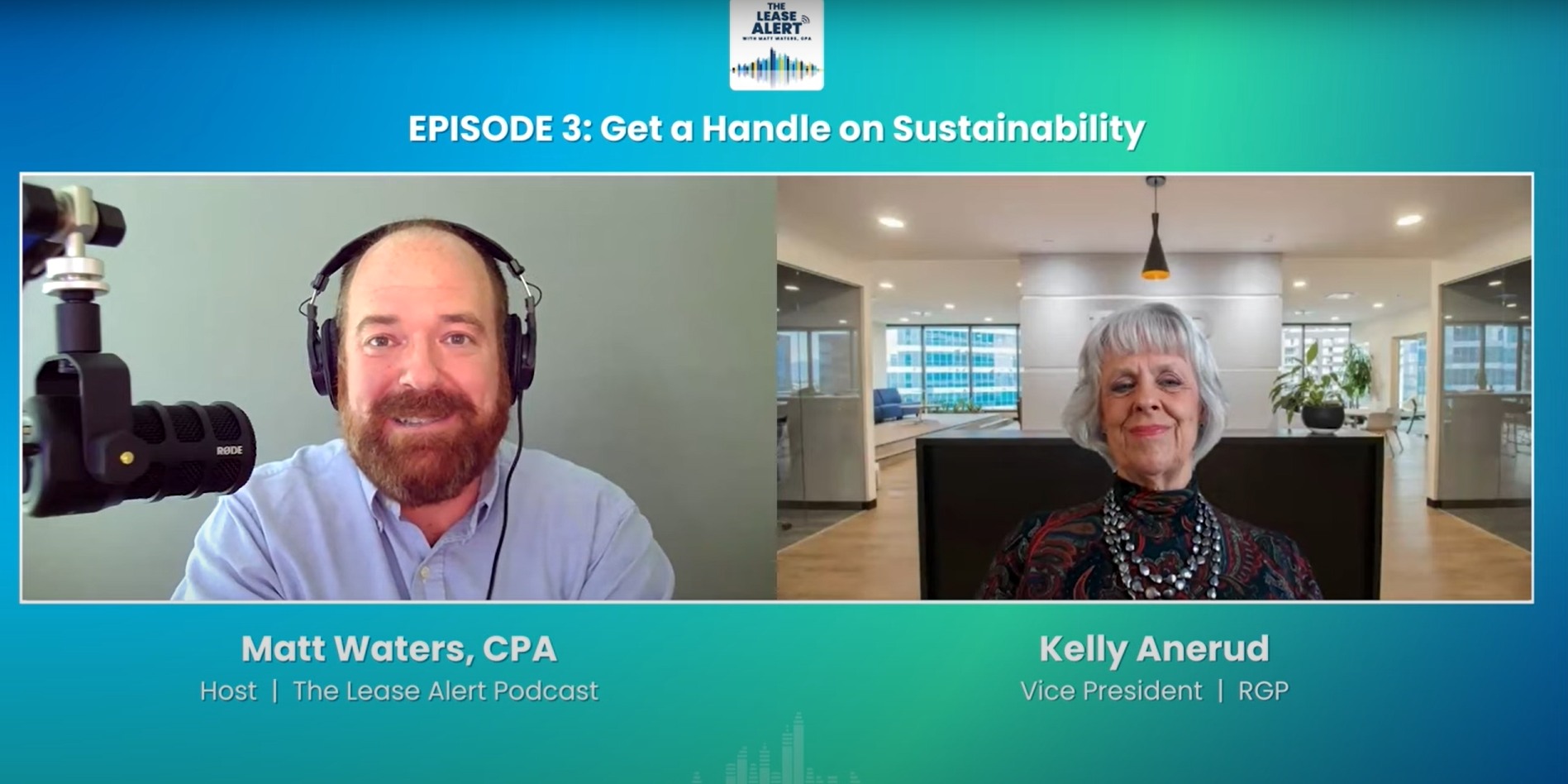Share this
Great Risks, Greater Rewards for Lease Accounting & Audit Teams
by Matt Waters, CPA on January 9, 2025
Al Stabile, The Lease Alert’s third guest, started out in accounting but pivoted to the field of lease audit. He has saved companies millions. And on today's episode, he offers practical steps on how you can expand your own professional impact.
“If you want to be excellent at what you do, you need to belong to some professional organization, not just attending, but dedicate your time and assist. Even if it's just starting out as a classroom monitor, get involved, participate, and over. 25 years. My experience has been good and I'm sure yours will be as well," said Stabile.
Watch the episode here or keep reading for all the best tips.
Matt Waters: Hello and welcome to The Lease Alert, where we have conversations with the smartest, most interesting people at the intersection of real estate, leasing and accounting.
I'm your host, Matt Waters. Let's learn something together.
Thank you for joining us today.
Al Stabile: Thanks Matt. Happy to be here.
Matt Waters: Al, I want to hear from you. What exactly is lease audit and how did you get here? How did you get to become the vice president of lease audit services at CBRE?
Al Stabile: Lease audit is essentially the review of all the financial considerations under the lease to ensure that the charges are appropriate between the lessor and the lessee or sub lessor and sub lessee.
The reason why it's so important is that unlike renting an apartment where you just have one line of rent, when it comes to commercial office, industrial or retail, there are many forms and financial considerations that transpire under the lease, all subject to various different calculations, restrictions and it's quite difficult to get them all correct all the time.
Our role is to review those charges, identify anything that would be outside the boundaries of both the lease as well as reasonable customary practices. Then to negotiate on behalf of our client, which is the tenant or occupier in almost all circumstances, to ensure that those charges are accurate, and to level set and ensure that all the charges going forward remain accurate under the lease.
It's kind of interesting. You asked how I got into this when I was an undergrad, I didn't sit there and say, “I'm going to be the best lease auditor in the world.” I thought I was training to be an accountant, and I started as a fixed asset accountant. My second opportunity for work was a supervisor role of fixed asset accounting, which I knew well, and this new thing called real estate accounting, which I had no clue what it was.
I took that position at Eddie Bauer many, many, many years ago, and realized after my first couple of years that I was saving the millions a year and that this could be a valuable service, but I needed to perform it for other companies and the best way to do that would be to obviously be on the revenue side of the equation and work for a professional real estate organization to ensure that you can reach and touch as many clients and savings opportunities as possible.
One thing led to another, and I left my role at Eddie Bauer after saving them everything I could. And I started with a small little company called Jones Lang Wooten, at the time out in California. I did that for quite some time and followed my boss and mentor at the time to two or three different companies.
And back in 2000, I started my own firm. I ran that organization, there were two of them for about a decade. And I was very fortunate to sell to Studley at the time, which was the seventh largest real estate firm in the world. At that time, Studley had recruited a bunch of people from CBRE to help develop their corporate services arm. Disenfranchisement occurred.
I was invited to start this practice at CBRE about eight years ago, I never looked back. In this business 30 years ago or 31 years ago, I've been able to assist saving our clients 350 million - a third of a billion dollars.

CBRE Research Reveals Intel about Office Conversions
High Vacancy to Outdated Offices: What's a CRE Team do?
It's a lot of value to provide. Our job is just to make sure that the terms that were agreed to are followed because it's just quite difficult to get everything right. We're a much-needed arm in the leasing world to ensure that all charters remain accurate and consistent through the course of that lease.
Matt Waters: Wow. That's fascinating. I want to dig in a little deeper on a couple of those things.
You have an accounting degree and that propelled you not into accounting in the traditional sense, but recently, we've talked a lot about the shortage of accountants. Less and less students are actually entering the field of accounting because they perceive other fields to be more interesting and exciting.
But I just heard you talk about after getting an accounting degree, going to work in real estate accounting, which propelled you into an exciting career, going to different firms, being an entrepreneur, having your own firm for a while, and then actually taking that entrepreneurial spirit to CBRE and actually starting a new division of CBRE as a massive global service provider company, a real estate services provider. To me, that sounds anything but boring. That sounds extremely exciting, starting with an accounting degree. I love that you brought that out in the context of your story. That's awesome.
Al Stabile: It's interesting, Matt, that when you say accounting, you get the picture of the bean counter and it's a stigma. But I have to say that most corporations, if you think about it, every single one has to account or do accounting. Accounting is a great way to get in and understand the inner mechanics of what makes a company profitable or not profitable.
The person that can figure out how to take that accounting knowledge - I was lucky enough to do it and be in the right place, right time - and convert that into actually a profit center is what made this unique. Most accounts, when they work within the lease administration or lease audit group for a company, they're considered a cost center, even if they save a little bit more than their cost is, but what I was able to do is to make it a little sexier and talk about how we can recover significant funds that will actually have a major impact on the bottom line of some organizations.
What most people overlook is that if you look at a typical P&L of a company, the second largest expense on that P& L is the real estate occupancy costs. When companies have to save money with HR and down, they're getting rid of people.
But on the real estate side, you don't have to get rid of anybody in your organization by engaging CBRE to perform a lease audit. We simply supplement what people do or don't have time to do and that's really the role of the lease auditors. To bring an incremental bottom line to the organization with the least amount of risk and expense.
Matt Waters: That's so interesting that you say that. Some people are not thinking in those terms. They're thinking of themselves, if they're an accountant in many ways, or perhaps a real estate administrator, lease administration professional, or somewhere in between, they're thinking of their department and themselves as a cost center, but all it takes is a slight flip of perspective. You realize if I can save the company, whatever it is, a hundred thousand, a million, think about how much the company has to sell in order to drop a hundred thousand dollars to the bottom line.
In my experience, I worked at Home Depot, think how many hammers and nails Home Depot had to sell to drop a hundred thousand dollars to the bottom line. In my job in real estate accounting or in my colleague's job in lease administration, we saved money into the order of a hundred thousand dollars all the time.
Now, back in those days, I didn't even think about it in those terms. I should have done a better job of presenting that in my performance reviews and so forth. Now I know because I've talked with a lot of folks like you, Al, but that's significant, that's a lot of savings, depending on what the margin of the company is, the selling costs and margin calculations, it actually takes an enormous amount of sales to drop a hundred thousand dollars to the bottom line.
If you knew the math at zero, if it's a bigger company, but an enormous amount of sales to drop that kind of money to the bottom line. You did this at Eddie Bauer, you've done this everywhere since you realized that early in your career that you could have these big wins and create this kind of value and you've been doing it ever since.
I'm just really encouraged to hear you present it in such a compelling way as an opportunity. It just takes a slight tweak to the perspective.
Al, I wanted to ask you, let's dig in a little deeper. I'm curious to know more about lease audit. My experience was mainly at Home Depot and seeing this from a CAM or Common Area Maintenance perspective, but it sounds like it goes way deeper than that and broader.
What are some of the risks that you're trying to identify when you go help a customer or a client with a lease audit?
Al Stabile: I think you brought up a great point about what the misnomer is in the industry. When you say lease audit, most folks just look at occupancy audits for operating expenses, can't tax and insurance.
Certainly there's a lot of room for a mistake because of just the detailed calculations, caps on controllables, caps on management fees, there's many different areas where things can go wrong. But occupancy costs are only about 40 percent of the picture. All financial considerations transpired under the lease would include direct charges.
It includes base rents, step ups, escalations of rent, as well as allowances. If you're looking at the retail side, percentage rent audits can be incredibly lucrative, but one must look at this a little differently in order to achieve. The risk is, if you're paying and or overpaying for a considerable period of time, the risk really is that you're going to lose the opportunity to recover.
Why? Because you could have a binding statement provision in your lease. You can have an audit window that only allows you to have the right of discovery for a certain period of time. The property can exchange hands, leave a stop, look at signs. All of these factors are really what's counting and working against lease audit.
It's quite important to get in there when you're performing a lease audit, which people normally think is purely retroactive, but it also has a go forward approach as well. While most auditors probably want their clients to constantly overpay so they can get the percentage of the recovery, I did it a little differently and CBRE appreciates this because of their overall standing in the real estate community. We want to earn the right to be a tenant advocate and in order to do that, you have to save money, not only going backwards, but going forward.
We also assist companies in deploying strategies to become more proactive and not letting money go out the door versus purely being reactive - certainly the combination of both. The real risk is not contemplating this as a possibility and letting too much time go by. I've seen tens of millions of dollars overpaid, but completely recoverable because they just weren't looked at in a timely fashion.
Matt Waters: Wow, you can’t just put this on the back burner and that's easy to do. With every company I've ever worked with or talked to there's always competing priorities. Of course, you're trying to be accurate right now, for this period you're trying to produce You’ve got to get the rent paid on time, you've got to get the accounting books closed on time. There's no option to not do that. You're many times responsible for contributing to forecasting and so the idea of actually doing another check, of going back and making sure that the items you just mentioned are all accurate and have been, and if there's any opportunity to make corrections, I can see how that easily slips to the back burner, but then you miss your window to actually make those corrections.
Is that right?
Al Stabile: That's true. And there's really no time to start like the present. You can't change what's occurred in the past, but what you can do is make some changes for the next five years. I think that's the way. Folks should look at it and I think the reason why it's not prioritized to the degree it should is because there's just a misunderstanding how much really could be there.
When I say, we're a third of a billion dollars or 350 million, it sounds like a lot - it is - but what one must need to realize is the amount of sheer work that goes into finding that and recovering it, because the overwhelming majority of audits have no savings or very immaterial part.
There's a plethora of trial and error and finding needles in haystack in order to find those big wins. It's not as easy as one may seem. You have to work really hard to get there, but the rewards are tremendous as well as the risks. And if a company wishes to do this, there's an industry of outsource professionals of which I belong to one firm of many that can do a really good job at taking a look at the portfolio and giving an assessment of what they think could be there.
I'm a risk taker, I'm an entrepreneur. I will take a risk and work on a percentage of the recoveries all day long because history has just taught me that it works out for all the parties. The first thing someone has to do is commit and actually explore the opportunity.
I call it drawing a line in the sand. We're going to draw a line in the sand today, Matt. We're going to try to recover everything we can going backwards. We're also going to establish the parameters going forwards that will assist in ensuring that you can mitigate your occupancy expenses to only the amounts that were intended under the lease.
Matt Waters: That sounds like a very proactive approach. You mentioned there the big wins. I think of course a big win would be receiving a large check back from the landlord, right? That's an obvious big win, but how else do you define winning?
Al Stabile: That's a great point. The other thing when people talk about lease audit, they think the savings is only going back and getting a check.
But if you think about it, you overpay a landlord, you give him a free loan, you collect 80 cents on the dollar in a settlement, and then you part with 35 percent for your auditor. Wouldn't it just be better not to let the money go out the door in the first place if you really think about it? A big win is also cost avoidance.
Last year we did an audit for corporate headquarters building and essentially the landlord was passing through a management fee that on the surface didn't seem excessive as a percentage of the total rents. But when you looked at what they were performing in terms of services, they weren't doing that much because a few things were self-performed.
We took a look at that. We leveraged our expertise in this particular market. And I went to the other side of the house at CBRE to find out what market rates are that they would charge as a landlord. And I was able to come back and make an argument that the management fees were not market.
[We asked], “where'd you come up with your numbers?” The landlord didn't really have much because they were wrong. They had a tremendous management fee concession over the life of this corporate headquarters building representing about 11 million worth of savings. It would be great to capture 11 million after it's overpaid, but the net result to the tenant would be a fraction of that 11 million for the deductions I mentioned earlier.
It's far better to catch these things earlier on and not let the money go out the door because it's just easier and you make more money. Lease audit is not just a reactive process. It should include a proactive process as well.
Matt Waters: Absolutely.
I attend the NRTA conference just about every year, and last year I went, and I noticed that they had a new award at NRTA. NRTA is the National Real Estate Tenants Association. They were presenting a new award, it was called the Excellence Award, And I hear the name announced, and it's Al Stabile.
You won the highest honor that NRTA offers, so first I'll say congratulations. I know you've been involved in NRTA for a long time. Can you tell us a little bit about what NRTA does? And then after that, I'd love to hear about how you have personally been involved, for how long and what you've learned there.

Your NRTA Primer is Here
Check out Lisa Krizek, NRTA Executive Director, on The Lease Alert
Al Stabile: Sure. The NRTA is essentially an organization that brings together the users of space and also the renters of space, landlords and tenants alike. It started off with just the tenant side and just retail, but it's morphed into the broader organization that focuses on just about everything that touches lease administration.
It's great for networking, but it's also great for training and getting incremental information just to make you better at your job. I joined, I think in 1998, I've only missed, I think three conferences since then I started off just as an attendee.
After spending some time in my first CAM audit class, there were some questions that the professor couldn't answer. I answered them for the class. By the end of the class, some of the questions were getting directed to me. I was getting a little nervous that I was overstepping, but I was just happy to help.
After the class was over, I got approached and asked if I would teach next year, which I certainly volunteered and was able to share information that was provided to me and give back to the community.
That's a good part of what the NRTA is about. I was asked to join a curriculum committee to start preparing content and also to motivate them and guide them. I did that for a few years.
Then the NRTA decided that it was going to embark on creating a certificate program for certified commercial lease administrators comparable to a paralegal certificate, just demonstrating from an organization standpoint that you know your stuff.
I accepted that role. It's been challenging. But we created four courses, all designed to address all of the main issues that a lease administrator and or lease auditor would confront within their job. So far, it's worked out very well. We're in our third course attendance has been up and participation is probably quadruple to the budget and more keep joining every quarter.
The reason being is we spend our time ensuring that the folks that take this course are the very best at what they do. So that when they go on and move on in their careers, if someone's interviewing them and they know the NRTA, they're going to say, wow, that person passed this course. I have a lot less risk in hiring this person because you can see something on a resume and they can say they do it well, but you won't pass this course unless you really do know it well.
Matt Waters: That's excellent. I have been honored to help out a little bit on that from a lease accounting perspective, and I can attest to the fact that the slides, the course, the material is very thorough. I can also attest that when I've been involved, Al tells great stories and brings real world examples into the class.
They also reach out to people like me who have other experiences. Al and I have had very different experiences, even though we both started with an accounting degree. We've had different tracks through the profession since then. I can tell you, NRTA strives to have real world examples and bring in speakers with real world experience to make the material kind of come to life.
Of course, there's always the text and the parts that you have to memorize, but I will say that NRTA does a great job of bringing in practitioners and real world examples into not just the certification process, but also to the conference and the sessions that are offered there as well.
So that's amazing. Again, congratulations for that award. I didn't know that you'd been involved for that long and in so many capacities, but now I know you even more, I realize that that sounds like a well-deserved award.
Al Stabile: It was a little bit of a surprise because I wasn't going to the conference that year.
I was saving the budget dollars so one of my coworkers could attend and Lisa Krizek, the executive of the NRTA, just kept saying, “hey, you should go. You should go.” And she pestered me enough where I'm like, “all right, Lisa.” Because I don't like saying no to Lisa. She was actually my very first client when I started my own company.
That's what paid back is in this business. She gave me a chance when it was a risk. Anytime that someone asks me for assistance, when they give me a chance, there's always red in the ledger and I feel obligated to help and I enjoy it actually, and I enjoy teaching.
What was interesting is then, Lisa started pestering me, “you're going to be at this luncheon,” and I'm like, “I don't know, I may have a call,” and she was like, “you know, you got to be there.”
My girlfriend was traveling with me. She [Lisa] pulled her [my girlfriend] aside. She goes, “you better make sure he's there, I'm not telling you why,” she goes, “don't say anything, but he has to be there and make sure he's wearing his blue NRTA shirt.” I matched everybody. And sure enough, we're sitting there, and my name gets called.
I was looking around the room. Everybody's looking at me and I'm like, “Oh, I guess I have to go up there.” I didn't really have any canned speech prepared, but I am usually never at a loss for words.
I just want to say once again that to Lisa Krizek and the rest of the NRTA, I am quite thankful to be recognized but that's not why I do it.
I do it for the faces of people that look satisfied with the class who come up to me and thank me for helping them in their career. Someone did that for me. I just ask everybody to do the same thing. Pay it forward. It just makes our industry stronger and better.
Matt Waters: No doubt. I'll just say on behalf of all those faces in the classes, thank you for making your classes interesting and bringing the passion that you do. That shows for sure.
I'll also just call out, I have not planned this as a part of The Lease Alert podcast, but it's interesting this season, we've had several people on who have brought up a common theme around professional organizations, not just helping their career. I think that's a no brainer.
It's a good opportunity to network at NRTA or other organizations. We had a Harvard MBA on who's an entrepreneur. She said her big break in her career came as a part of being a member of the AICPA in the accounting organization and the benefits that that provided.
Then we had a real estate broker on who's a managing broker at a firm in Denver. He said one of the big breaks in his career came basically from knowledge that he picked up at a CoreNet conference. As far as the impact of real estate on financial statements, he brought that up as a defining moment where he actually had a light bulb in a class that he took working on a certification.
He used that. He actually took it, applied it, used it with a customer or a client, I should say, and closed the biggest deal of his career.
Now we hear Al mention that the NRTA has intersected so many times that I won't even try to summarize. There's just this one interaction with Lisa, and that she was his first client in his own firm, and then now that relationship continues and provides benefits to both parties there.
Then we all benefit from that interaction as well when we take part in the classes and the resources that NRTA offers. I just wanted to call that out and say for those listening, if you're not already involved in a professional organization - and there are many out there - we just named a few, get involved. Look at the certifications that are offered. We, again, didn't intend this, but a theme has developed here that type of extra effort really pays back over and over throughout your career. Al, you agree?
Al Stabile: Oh, without a doubt. That last conference I wasn't going to attend and I did of course because Lisa was pushing for a wonderful reason.
I actually received the opportunity to meet one of my big wins for clients this year. They were attending the event. They saw the award. They heard me speak about something else and that just initiated a conversation.
Certainly, I didn't get the business because of my NRTA affiliation, but what it did is it just opened the door, allowed them to see that I had the recognition in the industry, and it just paved the way for me having a fair platform to compete.
The end result was winning another account where we get the pleasure of attempting to save them money. A lot of the folks that I've met in the organization over the past 25 years, people switch jobs, and you get the phone call, “Hey, I'm in a new place. I'd like to introduce you to my firm.”
That all comes from the dedication of volunteering. And I encourage everybody listening that, at least from my perspective, the advance in my career ... I worked hard, took chances, had a little bit of luck, certainly, but it was the people. Networking. People knowing who you are, when people pick up the phone and ask you for something in NRTA, put down what you're doing and help them. Someday, they may return the favor in a way you never expected. Nothing but good has come out of it for me, and I encourage everybody to find their organization if you want to be excellent at what you do, you need to belong to some professional organization, not just attending, but dedicate your time and assist, even if it's just starting out as a classroom monitor.
Get involved, participate, and over 25 years, my experience has been good, and I'm sure yours will be as well.
Matt Waters: Well said, Al. Thank you so much for joining us today. I really appreciate all your insights and sharing your experience on The Lease Alert podcast today.
Al Stabile: Happy to be here, Matt. Thanks so much for your participation in the NRTA and for all of you guys out there listening, I hope to see you all at the next NRTA conference.
Matt Waters: All right. Well, there you have it, folks. That's Al Stabile. Vice President, Lease Audit Services at CBRE, active NRTA member, and you can connect with him at the NRTA National Conference coming up in Texas, or via social media and email. We'll put his contact information in the show notes.
Thank you for listening to The Lease Alert. I'd be grateful if you would like and subscribe wherever you listen. Until next time, keep learning and leasing.

Share this
- ASC 842 (81)
- Lease Accounting Software (77)
- Accounting Teams (44)
- Lease Administration Software (25)
- Retail Tenants (15)
- Commercial Real Estate (12)
- Lease Management (11)
- Market Data and Analytics (7)
- Real Estate Teams (7)
- ESG (6)
- Success Stories (5)
- News and Media Coverage (4)
- Transaction Management Software (2)
- Customer Success (1)
- Office Tenants (1)
- January 2025 (3)
- December 2024 (2)
- November 2024 (2)
- October 2024 (4)
- September 2024 (2)
- August 2024 (5)
- July 2024 (3)
- June 2024 (3)
- May 2024 (4)
- April 2024 (1)
- February 2024 (1)
- December 2023 (4)
- November 2023 (6)
- October 2023 (4)
- September 2023 (2)
- August 2023 (2)
- July 2023 (3)
- May 2023 (2)
- March 2023 (1)
- February 2023 (3)
- January 2023 (1)
- December 2022 (3)
- November 2022 (4)
- October 2022 (4)
- September 2022 (1)
- August 2022 (4)
- June 2022 (1)
- May 2022 (4)
- April 2022 (8)
- March 2022 (3)
- February 2022 (1)
- January 2022 (2)
- November 2021 (2)
- October 2021 (2)
- September 2021 (3)
- August 2021 (15)
- July 2021 (3)
- June 2021 (1)
- May 2021 (1)
- April 2021 (3)
- March 2021 (1)
- January 2021 (1)
- December 2020 (3)
- November 2020 (1)
- October 2020 (2)
- September 2020 (2)
- August 2020 (3)
- July 2020 (2)
- June 2020 (3)
- May 2020 (1)
- April 2020 (1)
- March 2020 (1)
- February 2020 (1)
- December 2019 (1)
- October 2019 (1)
- September 2019 (2)
- August 2019 (3)
- July 2019 (2)
- April 2019 (69)
- October 2018 (1)
- August 2018 (1)
- July 2018 (1)
- June 2018 (1)
- May 2018 (1)
- April 2018 (2)
- March 2018 (3)
- February 2018 (2)
- December 2017 (1)
- August 2017 (3)
- June 2017 (2)
- May 2017 (2)
- April 2017 (1)
- March 2017 (2)
- January 2017 (2)
- November 2016 (2)
- July 2016 (1)
- June 2016 (1)
- July 2015 (1)
- March 2015 (1)
- June 2014 (1)
- April 2014 (11)
- October 2011 (1)
You May Also Like
These Related Stories

Taking Advantage of Growth Opportunities in Lease Accounting

Why are Lease Accountants Still Manually Entering Journal Entries?



